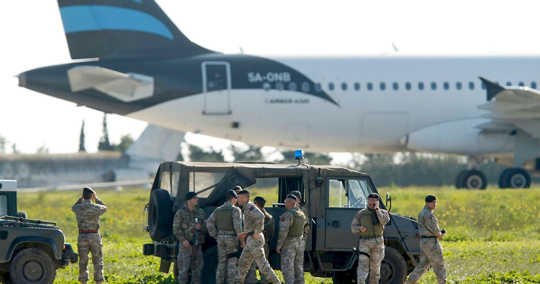Valletta, Dec 23: An airliner on an internal flight in Libya was hijacked and diverted to Malta where it landed on Friday, Maltese media reported. Two hijackers, reportedly having hand grenade, have threatened to blow up the Airbus A320, which had 118 people aboard, including seven crew, outlets including the Times of Malta said.

Maltese media reported that the hijacked plane was an Airbus 320 that had been on a domestic Libyan flight operated by Afriqiyah Airways. The aircraft had been flying from Sebha in southwest Libya to Tripoli.
The Malta airport authority said all emergency teams had been dispatched to the site of what it called an "unlawful interference" on the airport tarmac. The plane's engines were still running.
Maltese Prime Minister Joseph Muscat tweeted:
The tiny Mediterranean island of Malta is about 500 km (300 miles) north of the Libyan coast.
All flights in and out of Malta have been canceled.
Libya has been in a state of chaos since the 2011 overthrow of Moamer Kadhafi left warring militias battling for control of different parts of the country.
Forces loyal to a fledgling national unity government recently took control of the coastal city of Sirte, which had been a bastion for the ISIS since June 2015.
Western powers have pinned their hopes of containing jihadism in the energy-rich North African state on the government but it has failed to establish its authority over all of the country.
A rival authority rules the country's far east, backed by the forces under military strongman Marshal Khalifa Haftar, who have been battling terrorists in second city Benghazi.






Comments
Add new comment